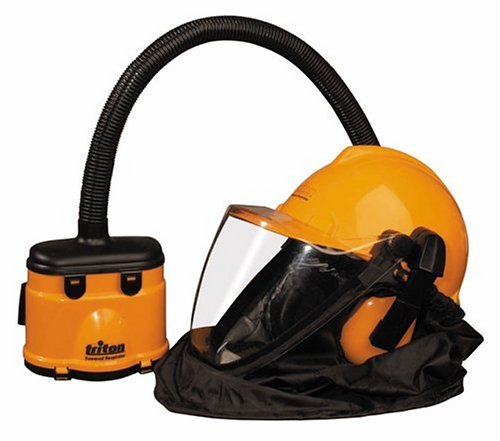-
Posts
6,539 -
Joined
-
Last visited
Content Type
Profiles
Forums
Events
Blogs
Gallery
Store
Everything posted by Northmount
-
Hey Chancey77, great to see you back! Tom
-
Keep the grain side out of daylight. Exposed areas will darken. Tom
-
Techsew in Montreal, @Techsew Ron is a member here and has a banner ad at the top of the page. Each time you refresh, new ads will be displayed. Another member @catskin is in Saskatoon and may be able to direct you to someone closer. According to the IP address, he/she is in Swift Current Saskatchewan. Tom
-
Use respirators with cartridges designed for the stuff you want to filter out. Some are listed as being for organics. Cap the cartridges when not in use to extend their life. If you can smell the stuff you are using through the cartridge, it's past time to replace it. Another option is to use a hood with a fresh air supply. For really nasty stuff and for dusty applications, I use a Triton hood like the photo, but hooked up to the exhaust of an old stick vacuum located outside. There are several manufactures of similar face shields and hoods. Your shop still needs to be ventilated to remove that noxious stuff. Tom
-
.thumb.jpg.6e903dd66163ad5672f00f144058c571.jpg)
Free Pdf Book On English Saddle Making
Northmount replied to AdamTill's topic in Saddle Construction
See attached file Tom Making a saddle.pdf -
.thumb.jpg.6e903dd66163ad5672f00f144058c571.jpg)
Several Machines for sale - Adler - 7 class - Landis 16
Northmount replied to Roy Davis's topic in Old/Sold
Roy Davis, Please read and abide by the market place rules, http://leatherworker.net/forum/forum/70-announcements/ Tom -
Moved to used sewing machines Tom
-
Add some photos please. Tom
-
Do you realize the time zone difference? Fellow needs to sleep sometime. 3PM here, roughly 11PM there. Tom
-
.thumb.jpg.6e903dd66163ad5672f00f144058c571.jpg)
Interesting very good quality clicker die
Northmount replied to KingsCountyLeather's topic in Leather Machinery
Moved it to leather machinery / clickers Tom -
djmc5678's IP address resolves to this location if it helps any: softbank060091103200.bbtec.net Nishinomiya, Hyōgo, 662-0933, Japan Tom
-
Take a look at http://www.leightons.ca/used-landis-30.html You will have to email them for a price. Tom
-
.thumb.jpg.6e903dd66163ad5672f00f144058c571.jpg)
Guitar Strap 'How to' and Free Pattern
Northmount replied to JimDavies's topic in Patterns and Templates
Fixed the link in the original post. Tom -
Just using the end of the ram. A plate as you have shown would help as long as the size of die is not too large. You could move up to a 3 ton arbor press if you want more punching power. Tom
- 11 replies
-
- leather tools
- press
-
(and 2 more)
Tagged with:
-
.thumb.jpg.6e903dd66163ad5672f00f144058c571.jpg)
heat press Has anyone ever used a Gold-Magic Robotemp 315?
Northmount replied to BearClawLeather's topic in Leather Machinery
Instructions and foils to use are fairly common to most hot foil presses. There are a number of videos on YouTube for different manufacturers. They all have some useful details if your are patient enough to wade through them. Tom -
Saddle stitch or machine stitch. Tom
- 15 replies
-
- football
- messenger bag
-
(and 1 more)
Tagged with:
-
It looks pretty good. You do some great work. Tom
-
I have just glued a patch on the inside for many tears. Use a similar leather so it has relatively the same flexibility, skive the edges of the patch a little, use a good grade of glue/cement. Where you have access to the back, I'd use contact cement. Tom
-
Works for small items. Have done 4" circle in 8/9 oz heavy temper leather, had to use 4 bites to make it work, plus some extra leverage. Tom
- 11 replies
-
- leather tools
- press
-
(and 2 more)
Tagged with:
-
.thumb.jpg.6e903dd66163ad5672f00f144058c571.jpg)
Review Of Servo Motor Sm645-2P Enduro™ Pro
Northmount replied to Bertil's topic in Leather Sewing Machines
And they lose torque at low speeds, thus the need for speed reducer pulleys unless you are only dealing with thin soft leather. Tom -
I would try laying the pieces out on a table, flat. Then try to arrange so they overlap and fill the area you need for your panel size. Trim the overlaps where needed, glue and stitch. May need to cut some pieces in half to fill voids on the edges. The pattern doesn't need to be repeatable, could be completely random. I think stitching them face to face and turning them face out would make the piece quite bulky and it may not lay flat. That's why I would do overlapping seams. Try a small panel and see if it works the way you want. Then let us know the best way you come up with. looking forward to seeing photos of the results, both as panels, and as a finished project. Good luck. Tom
- 15 replies
-
- football
- messenger bag
-
(and 1 more)
Tagged with:
-
If the photo is deleted from the hosting site, then you are left with a broken link. Also if someone closes, or re-organizes their hosting site, the photos are all gone from leatherworker.net. Some of the threads and posts become useless as there is no longer any illustrations. It is far better to re-size your photos to fit, so they will stay with your post and complement the text. Tom EDIT Feb 25 2023: This is an example from this thread of what happens to many 3rd party hosted photos. Post below has been severely edited to remove extraneous material.
-
CDSP IP address indicates he/she is in Brussels, Brussels Capital, 1012, Belgium A note to all members, especially new members: Please list your location. It helps get you better answers, especially for things that are local to you. You might also find someone who lives close to you that can help with one-on-one tutoring, etc. Maybe even a free coffee! Tom
-
.thumb.jpg.6e903dd66163ad5672f00f144058c571.jpg)
Front pocket wallet
Northmount replied to Bob Blea's topic in Purses, Wallets, Belts and Miscellaneous Pocket Items
Just really too nice! Tom -
Vacuum cleaner motors may be much higher speed than what you want. They really wind up! Tom




